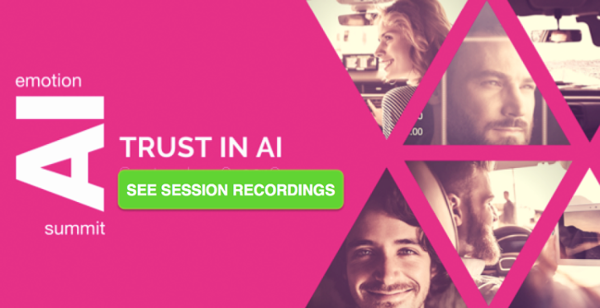Coming up on September 6th, Affectiva will host the Emotion AI Summit in Boston. This year, the event theme is “Trust in AI,” and how this manifests itself in vastly different areas: from automotive and robotics, to healthcare, education and even advertising. We will also explore how Emotion AI is a key component of building trust between humans and technology.
Trust is a key theme in next generation vehicles. Both humans trusting in AI to make safe and enjoyable driving decisions, but also autonomous AI trusting in human drivers to be alert and engaged and ready to take back control. Emotion AI helps foster this trust by gaining a deep understanding of what is going on with the people in a car—both passengers and drivers.
We will feature a number of sessions applicable to the automotive industry at the Emotion AI Summit this year - including the panel discussion, “Building Trust in Next Generation Vehicles,” when experts will explore how AI can build trust in next-generation vehicles. We currently see more automation aiming to make driving safer and more enjoyable, but causing a lot of consumer distraction and frustration. All of these dynamics are forcing car manufacturers to not only improve road safety, but also to rethink the future of transportation and the consumer brand experience. Trust is at the core of this.
Among the panelists is MIT Age Lab Research Scientist, Dr. Bryan Reimer, who is also the Associate Director of the New England University Transportation Center. We spoke with Bryan to get his take on the event’s “trust” theme, and how he envisions it playing out in the automotive space.
Why is trust in AI so key for the automotive industry?
As the automation ecosystem continues to evolve over the next several decades, our mobility space begins to change drastically. There’s an increasing number of AI-based mobility solutions on the horizon in the form of automated driving systems and robotaxis. Robotaxis in particular might someday just turn us from drivers into riders taking us places we want to go, take our kids to school, or our ailing parents to the doctor’s office. Our ability to trust that these systems will work seamlessly is really critical. Today, even in the context of placing a phone call within a vehicle, often seems more demanding than it really needs to be. So if we want to place our ultimate trust of our safety on the road—as pedestrians, cyclists, or drivers—in the hands of AI, a critical component is developing trust in the system.
What are the challenges in building that trust—what is the risk, or what could go wrong?
Trust is built over time and eroded quickly. So conceptually, one of the hardest parts of building trust is building upon expectations. Expectations vary by person to person: each person comes to a situation with different expectations. It is very difficult to seamlessly build a trust globally or even regionally. From Boston, Asia, to Europe - people are looking for different things at different times. Even between regions of the United States social dynamics of driving - such as traveling in the left lane and jaywalking change. Overall, as a human driver we may predict that a pedestrian could jump out in front, and if we are able to see them and react, that is fine. AI will have a harder time than humans detecting and recognizing the behaviors in coming years, making it difficult to build trust in a system that sometimes react in seemingly unpredictable ways. Trust in essence, needs to be personalized to match that expectation.
What are you doing today to overcome these challenges?
Trust is very much about how we sense the characteristics of the driver: how do we use novel, developing and evolving feedback mechanisms to build experiences based on expectations to build trust over time? The development of a “trust ecosystem” will drive the AI innovations that we want to market faster. Long term, the world is going to be highly automated—and now the big question is, can we build the trust necessary to accelerate the process and save lives along the way?
How can Emotion AI help?
Emotion AI is a really important piece of the puzzle here. As we look to personalize, mirror expectations and foster trust, building on the emotional characteristics of individuals is key. Tuning interfaces and feedback mechanisms to when you are happy, sad, or when you are having a difficult time will be critical to developing an interconnected ecosystem.
What do you see for the future?
Over the next several decades, perhaps even the century, we will move towards a much more highly automated mobility space. The question is not if, it is when. It also will depend on when we can build the trust necessary to accelerate the process into business opportunities. For example, will it be 5 years or 20 years before I walk out of my front door in the middle of the day and decide to call a robo-taxi? Am I going to drive with a new experience that doesn’t necessarily require me to touch the wheel? Or am I going to allow someone else at the whims of the computer monitor or someplace else in the world to drive something into my driveway and pick my kids up and take them to school?
Learn more: Dr. Bryan Reimer joined fellow panelists Dr. Karl Iagnemma of nuTonomy (acquired by Aptiv), Dr. Ola Bostrom of Veoneer, and moderator Regina Savage of Morgan Stanley to discuss the future of AI in automotive at the Emotion AI Summit on September 6th. See their discussion by downloading the sessions now.






